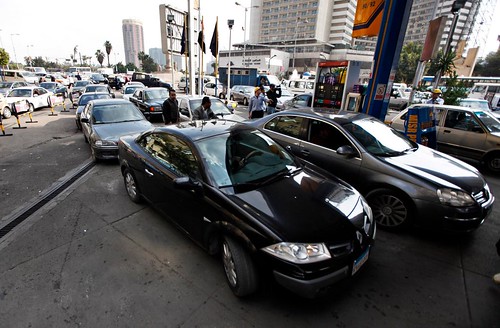
Egyptians line up at the gas station amid rumors of possible fuel price increases. Fuel prices have been increasingly throughout Africa and the world., a photo by Pan-African News Wire File Photos on Flickr.
Rumors fuel long lines, gas shortages in Egypt
By AYA BATRAWY, Associated Press
CAIRO (AP) — It's not clear which came first — the rumors or the fuel shortages — but for several days this week drivers had to wait in long lines only to find key grades of gasoline sold out across Cairo, a bustling city of some 18 million people.
Gas stations rationed their fuel, while gas station assistants seized the opportunity to demand 20 percent tips in some areas of the city. As motorists stocked up, supplies ran down, and before nightfall, dozens of stations were turning cars away.
Similar scenes were played out in other major Egyptian cities.
Yet nothing actually happened. Egypt's heavily subsidized gasoline, selling for about $1.20 a gallon, was still available at the same price as before. It wasn't even clear that there was a shortage.
The panic could reflect a repressed realization that Egypt cannot go on as it has for decades, deeply subsidizing fuel and other basic commodities to make up for low wages, bringing the subsidy bill to fully 40 percent of the nation's overstrained budget. Propping up the currency and pay out subsidies contributed to Egypt's losing half its foreign currency reservers over the past year.
The lines formed shortly after word spread that the country's interim government had approved a plan to cut energy subsidies for some industries. The news was widely interpreted by the public as a move to cut subsidies for gasoline and fuel for cooking and heating, on which millions of Egyptians depend, and the run on the gas stations began.
Popular conspiracy theories about the sudden fuel crisis did not directly address the subsidy issue. In a country schooled by its leaders for decades to attribute problems to dark plots and unknown foreign saboteurs, there was a feeling that something underhanded was afoot. That turned a mini-crisis into a politically charged rumor mill.
Cairo taxi driver Ahmed el-Sheikh was sure the fuel shortage was orchestrated as an attempt by the country's military rulers to make people long for the days when ousted President Hosni Mubarak was in power.
"Since this fuel crisis started, people started to say that under Mubarak, this never happened, and that he was a good president," el-Sheikh said.
"Maybe the military is doing this to soften people's hearts toward him," he said as a picture of Egyptian protesters killed in last year's uprising flapped back and forth from his rearview mirror. Mubarak is on trial, charged with complicity for the deaths of hundreds of protesters during the uprising that deposed him.
Some Egyptians charged that the military was keeping large amounts of gasoline for itself, as it plans an air show to commemorate this year's first anniversary of the start of the Jan. 25 uprising against Mubarak.
Another taxi driver, Abu-Peter Saleeb, blamed the petroleum companies for the fuel shortages.
"How do we know there's no gasoline? For all we know the gas stations were keeping gasoline underground to hike up prices later," Saleeb said.
The state-run radio weighed in by blaming "unknown" schemers, ranging from traders to street criminals, for hoarding gasoline in order to sell it later at higher prices.
Roqaya Shafie, one of many motorists who waited in line this week, blamed "spies" for trying to destabilize the country. However, she also said Egyptians, maybe even herself included, were partly to blame for the mad dash to gas stations around the country.
"We're a society that likes to stock up on things," she said.
The crisis blew over as quickly was it started. By Wednesday, most gas stations were operating normally and lines had nearly disappeared.
No comments:
Post a Comment